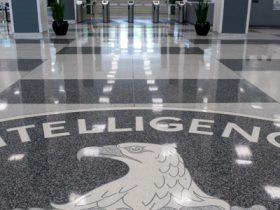PHNOM PENH, CAMBODIA — Secretary of Defense Lloyd Austin entered a room with the U.S. and Cambodian flags. He was there to shake hands with a dozen Cambodian military officers — all of whom had studied at American military schools as part of an exchange program between the two governments.
One officer who attended the U.S. Naval Academy joked about the annual Army-Navy football game. Austin, a former Army general, laughed.
“As secretary, I want everybody to win,” he said.
This is a new tactic in America’s relationship with Cambodia: a charm offensive. Austin’s visit marks the first time a U.S. defense secretary has traveled to the country just to meet with its leaders on defense issues. And it’s coming at a critical time.
Just before, Austin had attended the Shangri-La Dialogue, the region’s top defense summit. His speech outlined a partnership of Indo-Pacific states who share values like respect and sovereignty. The subtext, later shown in sharp questioning of Austin’s Chinese counterpart, was that those values are different than China’s.
But Cambodia is an exception. Phnom Penh has deepened its military ties with Beijing in recent years, and could soon host China’s second foreign military site.
Hence the visit. American defense officials framed it as a reset in ties with Cambodia, which has a new prime minister. A hallmark of foreign policy for many countries in Southeast Asia is that they want to keep their options open and not pick between two competing great powers. Still, it’s not clear whether the U.S. can convince Cambodia that Washington is an open option.
This may be a chance “for us to sit down and talk about how our relationship might have a more positive and optimistic path,” said a senior defense official, briefing reporters before the trip on the condition of anonymity.
‘Leaps and bounds’
All hope aside, the official acknowledged a host of challenges surrounding the visit.
For years, the U.S. has warned Cambodia against allowing China to build a permanent military site on Ream Naval Base, which sits in the south near the Gulf of Thailand.
The Center for Strategic and international Studies, which monitors satellite images of the site, said in April that Chinese military ships have docked at Ream for several months.
“Construction in the rest of Ream Naval Base has progressed by leaps and bounds” since the think tank last studied it, the report said.
The facility would help China, whose coast sits behind U.S.-aligned island nations like Taiwan and Japan, project its navy farther beyond its shores and into a critical waterway for world trade.
According to the Pentagon’s annual report on the Chinese military, Cambodia’s defense minister claimed in 2021 that China would be allowed to “modernize and expand Ream” but not be the only country with access to the site. The next summer the two countries opened the Chinese renovations, which now include warehouses, a fresh pier and a dry dock for maintenance.
Since then, the relationship with the U.S. has soured. Last year, Washington sanctioned the country for holding rigged elections. In a statement, the State Department said the ruling party had a chance “to improve the country’s international standing” by permitting real opposition parties and restoring democracy.
The red carpet
Such tension wasn’t on display in Phnom Penh.
Austin held a day of meetings with military and political leaders in the country. The defense ministry flew American and Cambodian flags alongside each other. At the country’s ornate senate building and ministry of defense, Austin walked on a literal red carpet.
Still the U.S. defense official speaking before the trip tried to manage expectations.
“This isn’t a visit that is about significant deliverables,” the official said.
According to a Pentagon statement, Austin discussed restarting military cooperation on issues like disaster relief and de-mining — a legacy from decades-old wars in Southeast Asia.
The topics alone are a sign of U.S. strategy: to smart small and try to grow their partnership over time.
Another bet is that America may now have a better partner. The new prime minister, Hun Manet entered office last summer after his father, a longtime authoritarian, officially stepped down. Hun is a former general, and in the 1990s he attended West Point — Austin’s alma mater, as the secretary’s social media account mentioned in a video of the two.
That said, Hun has done little to make Cambodia more democratic. The government represses opposition parties and polices dissent. It’s not clear whether his time in office represents continuity or change.
U.S. officials often say that there is no substitute for person-to-person meetings and list Austin’s travels to the Indo-Pacific — this is number 10 — like a scorecard. The meetings in Cambodia may test that argument.
Without officially confirming whether Austin discussed the naval site in his meetings, a Pentagon spokesperson was coy.
“There are no doubts about where our concerns are,” the spokesperson said in a statement.
The senior defense official speaking before the trip previewed that approach.
“We’ll be very direct and articulate about how we see U.S. interests,” the official said. “But nonetheless that’s no reason we can’t sit down and talk together.”
Noah Robertson is the Pentagon reporter at Defense News. He previously covered national security for the Christian Science Monitor. He holds a bachelor’s degree in English and government from the College of William & Mary in his hometown of Williamsburg, Virginia.
Read the full article here

:quality(70)/cloudfront-us-east-1.images.arcpublishing.com/archetype/2AWKWHAO2ZDJLPCHGH6CVPBCGU.jpg)
:quality(70)/cloudfront-us-east-1.images.arcpublishing.com/archetype/W3UFL22J6NEIPPRVBYINTAGPQQ.jpg)
:quality(70)/cloudfront-us-east-1.images.arcpublishing.com/archetype/OVGCUNF3UNAR3PHZA7VLDJFHGM.jpg)

:quality(70)/cloudfront-us-east-1.images.arcpublishing.com/archetype/OBBWXKC2HVH35HRVXGI6OTEN24.jpg)

Leave a Reply